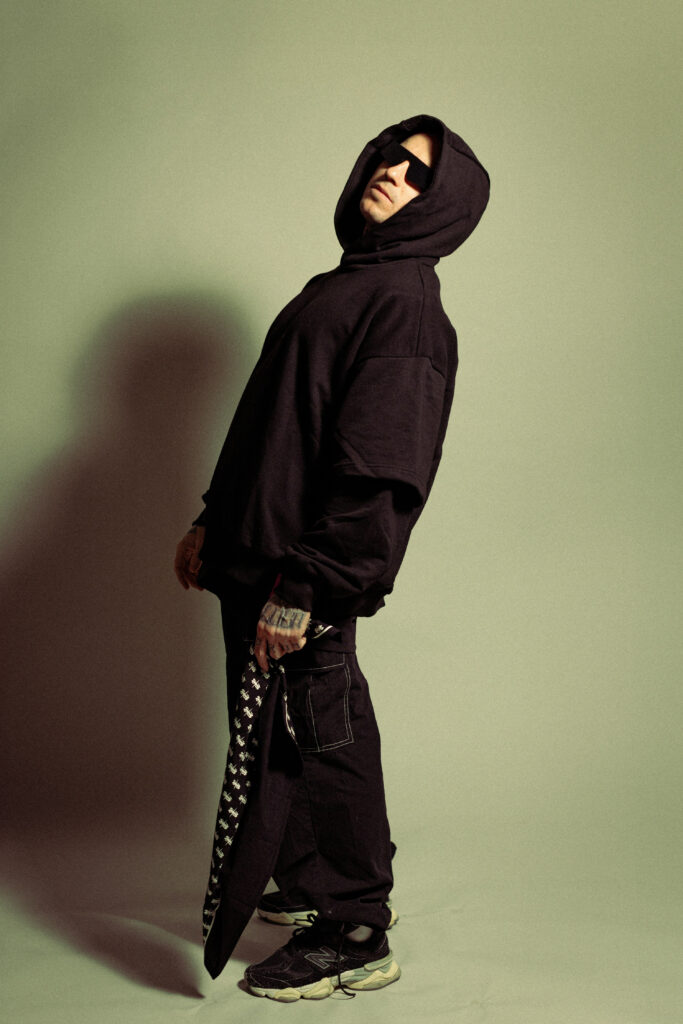Abbiamo intervistato Valentinø in occasione della release del suo ultimo EP “Baba Baby” su ARTCORE il 22 febbraio. Un viaggio attraverso le scelte che lo hanno condotto a questo momento così brillante della sua carriera.
Valentino Marchiori AKA Valentinø ha dedicato gran parte della sua vita alla musica. Genovese d’origine, è proprio nel capoluogo ligure che fonda un club, un’etichetta discografica, un festival e un brand.
Valentinø è un artista poliedrico in cui l’amore per la musica techno va oltre il DJing e la produzione. La sua passione si fonde con il desiderio di offrire a tutti la possibilità di vivere un’esperienza di clubbing autentica. Non a caso questo desiderio nasce a Genova tra il sound della techno underground. Non a Berlino, non in America, ma in una città italiana in cui era necessario ritagliare uno spazio per la clubculture.
Anni di scommesse che lo hanno condotto alla release di “Baba Baby” su ARTCORE, prevista il 22 febbraio. Dall’intervista emerge la profonda gratitudine di Valentino nei confronti di Indira Paganotto, che lo ha coinvolto in quella che lui stesso ha definito “la label alla quale puntavo da anni”.
Il nuovo EP “Baba Baby” porta con sé un upgrade stilistico rispetto al Valentino di qualche anno fa, influenzato dalla techno underground di Berlino e Chicago. Nell’EP prevalgono sonorità acid e tribe, in cui la nota hard si intreccia con la psichedelia.
Nel 2024 prenderà parte al tour mondiale di ARTCORE che farà tappa a Miami, Madrid, Barcellona e non solo. In occasione dell’uscita di “Baba Baby” sulla label spagnola, abbiamo avuto l’opportunità di scambiare due chiacchiere con Valentinø, che ci ha raccontato le sue emozioni e i suoi progetti a venire.
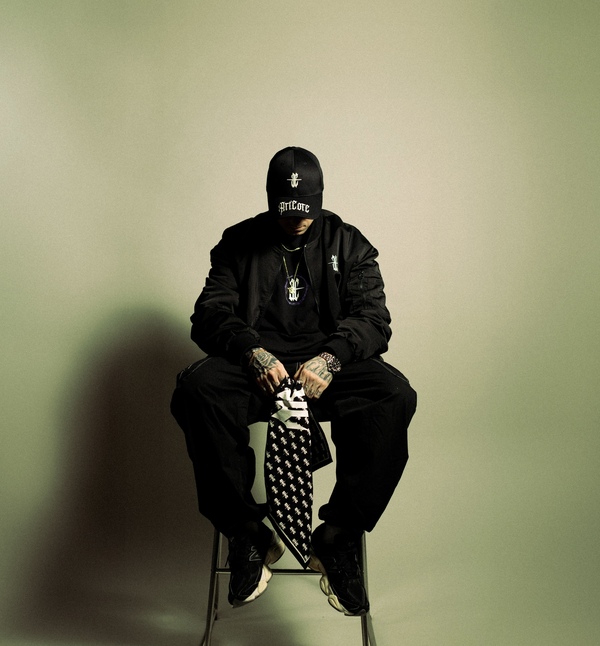
Ciao Valentinø, benvenuto su Parkett. È un piacere averti qui in questo momento così speciale della tua carriera. Iniziamo proprio da qui, dalla release del tuo ultimo EP “Baba Baby” su ARTCORE, l’etichetta di Indira Paganotto. Come ti senti? Credi ci sia un motivo particolare per cui quest’occasione è arrivata proprio in questo momento della tua carriera e, in generale, della tua vita?
Ciao Parkett, innanzitutto sono molto felice di poter rilasciare questa intervista per voi, e parto dicendovi che sono estremamente contento di questa collaborazione. Ammetto di essere anche un pò agitato e ansioso per una cosa che non accade tutti i giorni. Dal nulla mi sono trovato catapultato dentro una delle label più forti che esistono e, se posso dire, la label alla quale puntavo da anni. E’ stata sicuramente una sorpresa, non me lo aspettavo, e non credevo che potesse succedere tutto così in fretta nel giro di pochissimi mesi. Ci ho sperato tanto e ho lavorato sodo per anni affinchè questo accadesse. In tutta onestà penso che questo sia stato il momento migliore per affrontare un passo così grande, sia musicalmente che come periodo temporale per far sentire nel mondo il mio stile.
Abbiamo ascoltato in anteprima Baba Baby, il tuo nuovo EP in uscita su ARTCORE il 22 febbraio. Lo stile delle due tracce chiarisce da sé la ragione dell’interesse di PSYMAMA e della sua etichetta. Nel tuo sound psy-trance e tribe, l’influenza hard si intreccia con la psichedelia. Quali sono i generi o le tracce che ti hanno ispirato nella produzione dell’EP? Lo ritieni coerente con le tue produzioni precedenti o rappresenta una svolta?
Musicalmente è stata una svolta, un upgrade rispetto a quello che era il Valentinø di qualche anno fa, con un sound più incentrato sulle sonorità underground della techno Berlino e/o Chicago. Per poter apprendere al meglio cosa volesse dire Artcore, ho cercato di seguire Indira dal vivo ogni volta che mi era possibile. Ogni suo dj set era un vulcano di suoni e note veramente mai sentiti prima. Da quel momento mi sono appassionato a quel sound psy a tal punto da volerlo proporre nei miei set e nelle mie produzioni.
In generale, qual è il tuo background come artista? Quali sono, e in che modo ti hanno influenzato le tue origini musicali?
Nasco figlio d’arte e fin da piccolo i miei “giochi” erano gli strumenti che papà aveva in casa o in studio, è stato amore a prima vista. Frequentando la night life ho avuto modo di avvicinarmi ai club della mia città. Ho scoperto, come dicevo nella domanda precedente, un genere mainstream molto in voga in quel periodo, che era la techno underground. Mi si è aperto un mondo e da li è nato tutto il mio percorso.
Sei nato e cresciuto a Genova, città in cui sei molto attivo con diversi progetti quali Mantra Club e Genova Dance Parade. C’è un momento, un inizio o un progetto a cui sei particolarmente affezionato?
Grazie a quello che ho creato il mio nome è arrivato sulla bocca di tanti addetti ai lavori. La mia idea era partita per scommessa personale, ovvero creare un club di riferimento in Italia fondato sul movimento techno, sulla falsariga dei colleghi tedeschi e americani. Un locale dove il pubblico avrebbe ascoltato musica ricercata, indipendentemente dal calibro dell’artista ospitato. L’idea era ed è tutt’ora quella di far rivivere al pubblico il clubbing nella sua forma più pura, ovvero ballare e divertirsi senza l’utilizzo degli smartphone. E’ anche per questo che dopo il Covid ho deciso di riaprire il Mantra e vietare con un bollino apposito la possibilità di creare contenuti social, per permettere di godersi la musica a 360 gradi. Passati 9 anni di clubbing sono ancora affezionato alla mia creatura, il Mantra, locale che mi ha dato l’occasione di creare a Genova qualcosa di unico mai visto in Italia. Con l’aiuto delle istituzioni e del comune è nata la prima Dance Parade che prende il nome dalla città (Genova Dance Parade). Come prima edizione, si parla di almeno 50.000 presenze da quasi tutta Italia, il che mi permette di dire che abbiamo ottenuto l’effetto sperato.
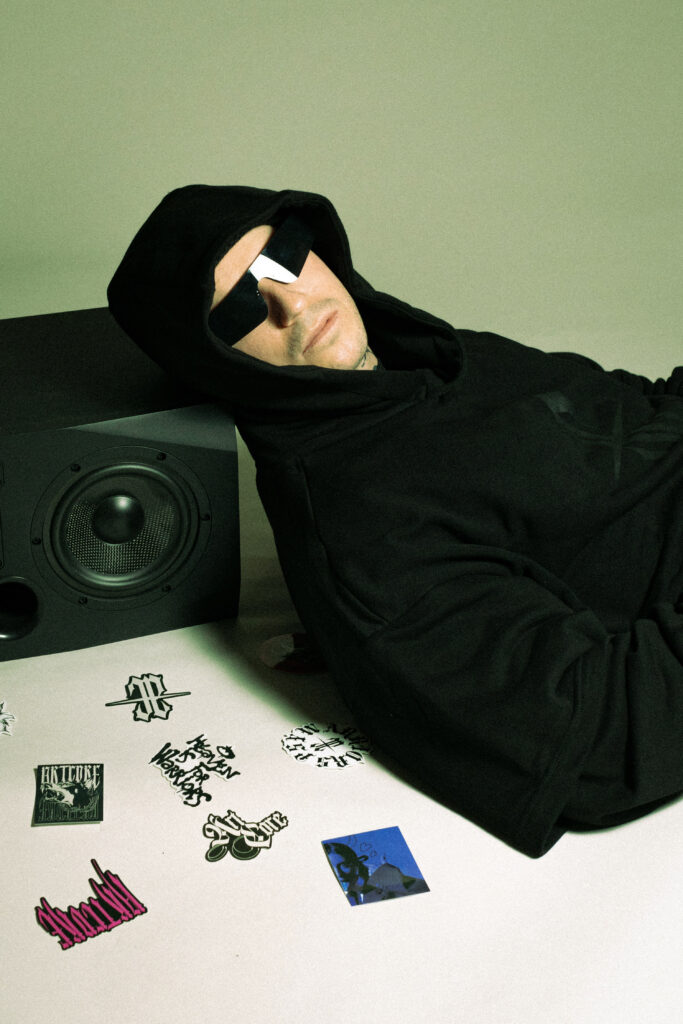
Hai anche fondato la label Overtime Recordings, sapresti definire l’identità e gli obiettivi dell’etichetta? Che consigli daresti a chi vuole cimentarsi nella creazione di format, party e label nella propria città?
Penso che la creazione di una propria etichetta discografica sia il sogno di ogni artista. Sentivo di voler esprimere la mia idea in totale autonomia e di voler iniziare a dare uno spazio in più non solo alle mie idee musicali, ma anche dare una possibilità a coloro che iniziavano ad avvicinarsi alle produzioni in studio o che semplicemente desideravano esprimere il proprio lavoro. Così facendo posso dire di aver raggiunto obiettivi importanti. Il mio nome ora è associato ad un Club, ad un Festival, ad una Label e ad un brand, mio personale. Il consiglio che mi sento di dare a coloro che vogliono intraprendere questo tipo di percorso è avere delle idee innovative. E’ necessario curare ogni aspetto che sia musicale, grafico, fotografico, organizzativo e promozionale senza tralasciare la scelta del personale, dei collaboratori, dello staff, seguirlo, conoscerlo, improntarlo sulla propria idea. La costanza, l’impegno e il voler alzare sempre di più l’asticella porteranno grandi risultati e soddisfazioni.
Nei mesi scorsi si è diffuso sui social un dibattito che da un lato, ha giudicato negativamente la diffusione dell’hard-techno come prodotto mainstream, mettendone in discussione la qualità delle produzioni; d’altro lato ha cercato di distinguere la buona dalla cattiva techno in relazione ai bpm, analizzando in particolare la soglia sopra\sotto i 140 bpm. Pensi sia sensato? In un mercato saturo, cos’è che rende unica la tua musica?
I generi musicali in questo momento cambiano velocemente, vanno e vengono con una velocità disarmante, un giorno sei l’artista con il genere piu in voga, il giorno dopo non sei più nessuno. Il Covid ha dato vita a questo scenario più hard e cosi facendo è riuscito a far avvicinare un grande flusso di giovani per il quale l’Hard Techno era terra sconosciuta. Anche il modo di vestirsi nella scena hard techno, l’abbigliamento che indossano i giovani, sono indumenti che in città come Berlino trovi anche alla luce del giorno. Vestirsi dark, indossare catene, anelli, bracciali, avere un certo taglio di capelli, uno stile che riporta alla scena underground anni 90/2000. I generi si rincorrono, tutto finisce e tutto torna. In un mercato così saturo, a volte scontato, ciò che fa la differenza è la ricerca costante della novità, la ricerca di quel qualcosa che dia un’impronta al lato artistico del dj, che ne faccia ricordare lo stile, e io personalmente con l’uscita su ARTCORE penso di poter far ascoltare qualcosa di nuovo al pubblico.
Grazie alla release di Baba Baby su ARTCORE, nel 2024 prenderai parte al tour mondiale della label che farà tappa a Miami, Madrid, Barcellona e non solo. Concludo augurandoti buona fortuna a nome di Parkett, e chiedendoti cosa dobbiamo aspettarci dai tuoi prossimi set in giro per il mondo? Quando prepari un set, cosa influenza la scelta o la produzione delle tracce?
Grazie al progetto di Indira (che non smetterò mai di ringraziare) avrò l’occasione di potermi esprimere su grandi palchi. Non vedo l’ora di misurarmi con una realtà cosi grande e dare il massimo. Ogni serata che affronto ha un set dedicato, ma a differenza magari di colleghi che lo preparano in settimana, io tendo ad arrivare sempre all’ultimo minuto, alla scelta finale, cercando informazioni sul locale, cercando di capire da che clientela è frequentato, tutta una serie di informazioni che mi portano a scegliere la mia scaletta, la sera stessa in hotel, tra una chiacchiera con il team, alternato a momenti di solitudine con le mie cuffie, e le tracce in sottofondo.
Ringrazio di cuore Parkett, vi lascio con un ultima frase…
Ora che sono nel mondo dei grandi, voglio restarci Babyyyy !!!
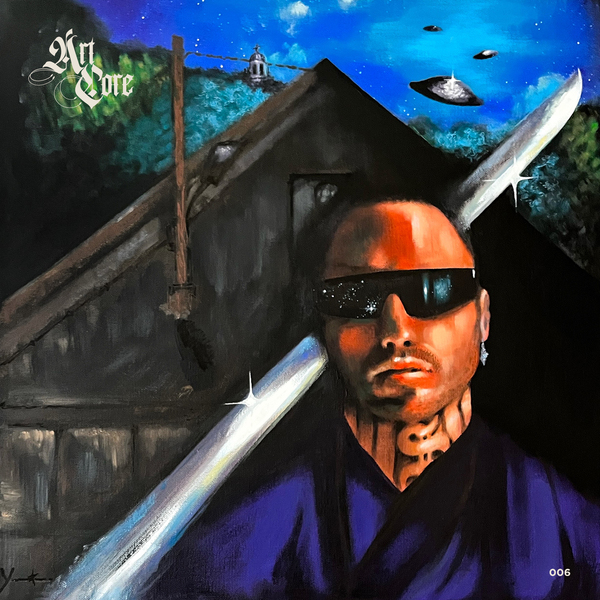
ENGLISH VERSION
Hi Valentinø, welcome to Parkett. It’s a pleasure to have you here at this special moment in your career. Let’s start right here, with the release of your latest EP “Baba Baby” on ARTCORE, Indira Paganotto’s label. How do you feel? Do you think there is a particular reason why this opportunity came at this moment in your career and, in general, in your life?
Hi Parkett, first of all I am very happy to do this interview for you, and I start by telling you that I am extremely happy about this collaboration. I admit to being a little nervous and anxious about something that doesn’t happen every day. Out of nowhere I found myself catapulted into one of the strongest labels that exist and, if I may say, the label I had been aiming for years. It was definitely a surprise, I didn’t expect it, and I didn’t believe it could all happen so quickly in just a few months. I hoped so much and worked hard for years to make this happen. Honestly I think this was the best time to take such a big step, both musically and as a time period to make my style heard in the world.
We listened to a preview of Baba Baby, your new EP out on ARTCORE on February 22nd. The style of the two tracks clarifies the reason for the interest of PSYMAMA and her label. In your psy-trance and tribe sound, hard influence is intertwined with psychedelia. What genres or tracks inspired you during EP production? Do you consider it consistent with your previous productions or does it represent a turning point?
Musically it’s a turning point, an upgrade compared to what Valentinø was a few years ago, with a sound more focused on the underground sounds of Berlin and/or Chicago techno. In order to better learn what Artcore meant, I tried to follow Indira live whenever possible. Each of her DJ sets was a volcano of sounds and notes truly never heard before. From that moment I became passionate about that psy sound to the point that I wanted to propose it in my sets and in my productions.
In general, what is your background as an artist? What are they, and how have your musical origins influenced you?
I was born as son of art and since I was a baby my “games” were the tools that my dad had at home or at studio, it was love at first sight. By frequenting nightlife I had the opportunity to get closer to the clubs of my city. I discovered, as I said in the previous question, a mainstream genre that was very popular in that period, which was underground techno. A world opened up to me and my whole journey was born from there.
You were born and raised in Genoa, a city where you are very active with various projects such as Mantra Club and Genova Dance Parade. Is there a moment, a beginning or a project that you are particularly fond of?
Thanks to what I created, my name has known by many professionals. My idea started as a personal bet, that is to create a reference club in Italy based on techno movement, along the lines of my German and American colleagues. A venue where the public would listen to sophisticated music, regardless of fame of the artist hosted. The idea was and still is to make the public relive clubbing in its purest form, that is, dancing and having fun without using smartphones. It is also for this reason that after Covid I decided to reopen Mantra and prohibit to creating social content with a special sticker, to allow you to enjoy music at 360 degrees. After 9 years of clubbing, I am still fond of my creation, the Mantra, a club that gave me the opportunity to create something unique in Genoa never seen in Italy. With the help of the institutions and the municipality, the first Dance Parade was born, which takes its name from the city (Genova Dance Parade). As the first edition, we are talking about at least 50,000 attendees from almost all of Italy, which allows me to say that we achieved the desired effect.
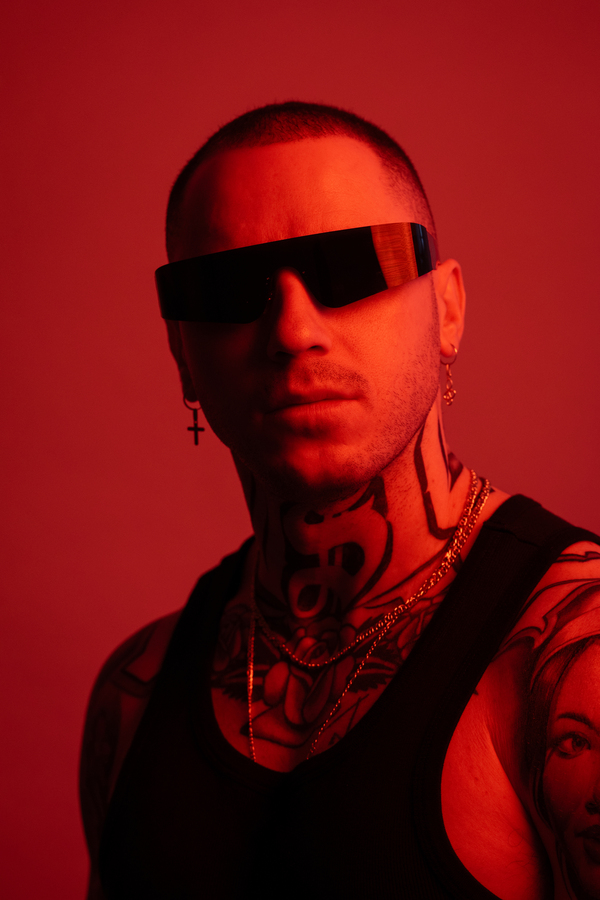
You also founded Overtime Recordings label, could you define the identity and objectives of label? What advice would you give to those who want to try to creating formats, parties and labels in their city?
I think creating your own record label is every artist’s dream. I felt I wanted to express my idea in total autonomy and I wanted to start giving more space not only to my musical ideas, but also to give a chance to those who were starting to approach studio productions or who simply wanted to express their work. In this way I can say that I have achieved important objectives. My name is now associated with a Club, a Festival, a Label and a brand, my own. The advice I would like to give to those who want to undertake this type of path is to have innovative ideas. It is necessary to take care of every aspect whether musical, graphic, photographic, organizational and promotional without neglecting the choice of personnel, collaborators, staff, following them, knowing them, basing them on your own idea. Constancy, commitment and the desire to increasingly raise the bar will bring great results and satisfaction.
Recently, a debate has spread on social media which on the one hand has negatively judged the spread of hard-techno as a mainstream product, questioning the quality of productions; on the other hand he tried to distinguish good from bad techno in relation to bpm, analyzing in particular the threshold above/below 140 bpm. Do you think this makes sense? In a saturated market, what makes your music unique?
Musical genres are changing quickly now, they come and go with disarming speed, one day you’re the artist with the most popular genre, the next day you’re nobody anymore. Covid gave life to this harder scenario and in doing so managed to bring together a large flow of young people for whom Hard Techno was an unknown land. Even the way of dressing in the hard techno scene, the clothing that young people wear, are garments that in cities like Berlin you can also find during the day. Dressing dark, wearing chains, rings, bracelets, having a certain haircut, a style that takes you back to the 90s/2000s underground scene. Genres chase each other, everything ends and everything comes back. In such a saturated, sometimes obvious market, what makes the difference is the constant search for novelty, the search for that something that gives an imprint to the artistic side of the DJ, that makes him remember his style, and I personally think that with the release on ARTCORE I can make the public listen to something new.
Thanks to Baba Baby release on ARTCORE, in 2024 you will take part to ARTCORE world tour which will stop in Miami, Madrid, Barcelona and beyond. I end by wishing you good luck by Parkett’s team, and asking what can we expect from your next sets around the world? When you prepare a set, what influences the choice or production of tracks?
Thanks to Indira’s project (which I will never stop thanking) I will have the opportunity to express myself on big stages. I can’t wait to compete with such a great reality and give my best. Every party has a dedicated set, but unlike colleagues who prepare it during the week, I always arrive at the last minute, at the final choice, looking for information on the venue, trying to understand which people frequents it, some information that leads me to choose my tracklist, that same evening at the hotel, between a chat with the team, alternating with moments of solitude with my headphones, and the tracks in the background.
I sincerely thank Parkett, I leave you with one last sentence..
Now that I’m in the world of adults, I want to stay there Babyyyy!!!
